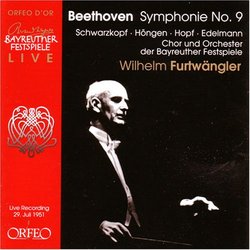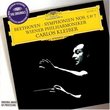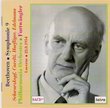| All Artists: Ludwig van Beethoven, Wilhelm Furtwängler, Bayreuth Festival Orchestra, Elisabeth Schwarzkopf, Hans Hopf Title: Beethoven: Symphony No. 9 Members Wishing: 1 Total Copies: 0 Label: Orfeo D'or Original Release Date: 1/1/2008 Re-Release Date: 3/25/2008 Album Type: Import Genre: Classical Styles: Opera & Classical Vocal, Forms & Genres, Symphonies, Historical Periods, Classical (c.1770-1830), Modern, 20th, & 21st Century, Symphonies Number of Discs: 1 SwapaCD Credits: 1 UPC: 675754006112 |
Search - Ludwig van Beethoven, Wilhelm Furtwängler, Bayreuth Festival Orchestra :: Beethoven: Symphony No. 9
 | Ludwig van Beethoven, Wilhelm Furtwängler, Bayreuth Festival Orchestra Beethoven: Symphony No. 9 Genre: Classical
|
Larger Image |
CD DetailsSimilar CDs |
CD ReviewsThe REAL Bayreuth Ninth! Ralph J. Steinberg | New York, NY United States | 05/13/2008 (5 out of 5 stars) "In 1960, I purchased my first Beethoven Ninth, the 1951 Furtwaengler/Bayreuth recording on German Electrola. It was also my first exposure to the supreme Beethoven conductor. Since then, I have acquired many other Ninths, including the 1942 Furtwaengler Berlin Ninth, which up to now was my favorite. I was recently shocked ot learn that the EMI Bayreuth Ninth was NOT the actual performance, but mainly a taping of the DRESS REHEARSAL, as ordered by Walter Legge. For anyone accustomed to the EMI, this Orfeo issue of the actual live performance will come as a shock. The playing of the orchestra is FAR more accurate and incisive, the balance between orchestra and chorus is far superior (the chorus has tremendous presence, unlike in the EMI set) and the whole has a vigor and cohesiveness lacking in the EMI. It is quite clear that the "Bayreuth Ninth" has been fraudulantly misrepresented by EMI for decades, and we owe Orfeo much thanks in setting the record straight. So how do I rank this Ninth? It is a more settled and confident conception than the earlier performances, no doubt because Furtwaengler was finally able to conduct thie paean of human fraternity (Alle Menschen werden Brueder) without Nazis holding a gun to his back. The Finale reduced me to tears. This performance was both Furtwaengler's and Beethoven's moment of triumph, and it displaces the Berlin Ninth from top honors. FURTWAENGLER REMAINS THE GREATEST OF ALL BEETHOVEN CONDUCTORS." The Best performance of a great symphony Archaeologist | Los Angeles, CA | 07/02/2009 (5 out of 5 stars) "This is a great recording. In 1951 the Bayreuth Festival was held for the first time since the Second World War. For the opening night Furtwängler was asked to conduct Beethoven's Choral Symphony. This is a live concert, extremely inspired and beautifully recorded and remastered. Now, the controversy around the two recordings of the Ninth in that night of July 1951. The one broadly distributed by EMI is now questioned for being a reconstructed version of the performance, which has put together bits and pieces from rehearsals and the actual concert. As for the sound, this ORFEO CD sounds far better than the one issued by EMI. There is also a Music and Arts CD which sounds good, but it is hard to find it. This performance has also been issued by NAXOS. This is one of the greatest performances of the Ninth available on disc." Interesting. Great? Only if you prefer the conductor over th Elvis Beniamin Costea | Arad, Romania | 04/26/2010 (3 out of 5 stars) "I know many people will be angry with me for saying anything less than apotheosizing about this recording, but I will say it anyway.
In my opinion, and I believe many will agree with me, a musical piece is the translation in musical language of a feeling, an emotion or an idea that the composer experienced or had. If you agree to me on this, then you will also agree that a conductor's (or performer's) main purpose is to bring that certain emotion or idea to life. He will most certainly leave his personal "fingerprint" on the rendition, and that fingerprint will be more or less obvious, depending on the conductor. What you prefer is a matter of taste, but I must warn you that Furtwängler conducts in such a way that the final output sounds more like his work than that of the composer. That being said, this recording of Beethoven's Ninth wonderfully epitomises Furtwängler's art. It is emotionally uplifting without ever being schmaltzy, maudlin or mawkish (this is in and of itself a great accomplishment). But it is rather sloppy at times, highly subjective and therefore ultimately pointless. Why do I say that? Because the composer's intentions are almost completely neglected. The only thing that matters in this recording is the conductor's vision of the work. Now I must say that this vision is quite deep, impressive, incandescent at times. But he interferes so much with the music that it ultimately becomes little more than a self-indulging, albeit poetic interpretation of this great work. While such enterprises may be interesting and even display significant artistic merit, I believe it is unwise to induct such subjective interpretations into the rostrum of the greatest recordings in history (a similar case is the beautiful but excessively self-indulged du Pré/Barenboim reading of Brahms' Cello Sonatas). Let me show you what I mean. Beethoven is known for his numerous and strict metronome indications. I am aware of the fact that a mere human metronome sitting in front of an orchestra and just executing the composer's instructions makes the music sound listless and trite. Great conductors and performers how to leave their personal mark on the music. They know when and how to take "artistic licence" from the composer's indications to great effect. However Furtwängler takes way too much artistic licence. He completely disregards Beethoven's metronome markings. The introduction of the symphony, marked "Allegro ma non troppo", is played in a kind of "Larghetto" tempo. The Scherzo, marked "Molto vivace" with a 116 bpm metronome marking, is rendered as a type of "Allegro moderato" (I could hardly listen to the Scherzo at first; it took a while to get used to the tempo). Most of the instrumental "Ode to Joy" theme is slowed down from Beethoven's original 80 bpm to about 50-55 bpm, while the famous "Turkish March" (Alla marcia, 84 bpm) is played at an incredible 140 bpm. Furtwängler also makes extensive (I would say excessive) use of rubatos where Beethoven made no such indication. Therefore, this ceases to be "Beethoven's Ninth". It is a deeply personal rendition of a great musical work. I like it. Furtwängler, probably better than any other conductor since the advent of classical recordings, understood the realms to which music can elevate us. And despite the excentric tempos and numerous alterations of Beethoven's intentions, his reading is so powerful that he somehow makes you suspend disbelief and accept this interpretation as it is. But I take the greatest possible exception to calling such a subjective interpretation "definitive", "ultimate", "the greatest ever". This rendition, while being emotionally uplifting, is a self-gratifying rather than spiritually or intelectually enriching experience. The same is true of most of Furtwängler's work. Of course, you might say that I have no real arguments to prove the objective aesthetic superiority of other, more "cerebral" recordings. That may be true. My approach to music is by no means the only valid one. However, I think I speak for many people when I say that I have a strong preference for hearing more of the composer's ideas than the conductor's (or performer's) feelings, be they however interesting." |

 Track Listings (4) - Disc #1
Track Listings (4) - Disc #1



